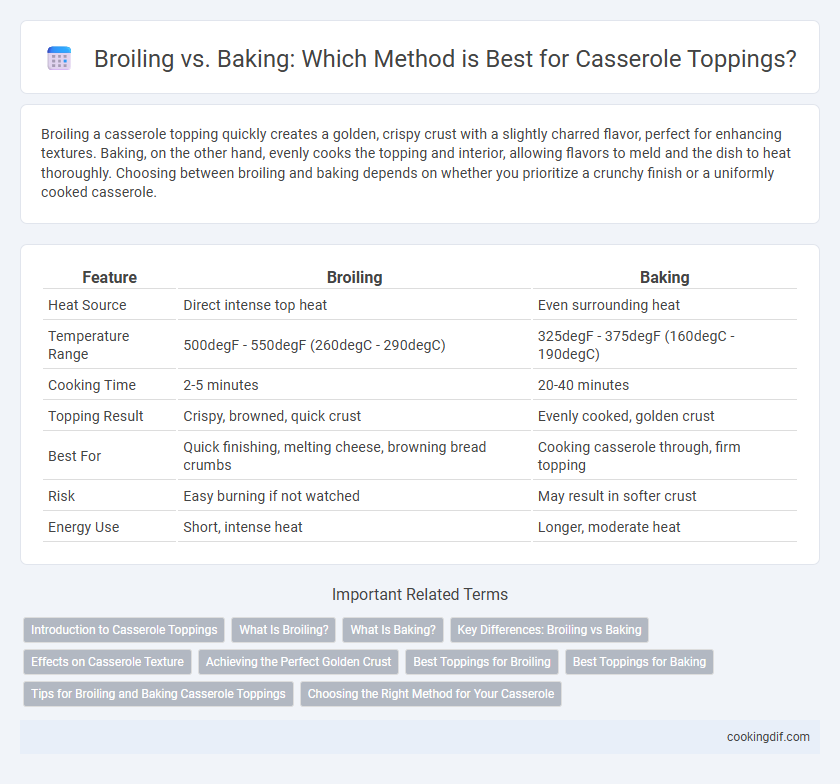Broiling a casserole topping quickly creates a golden, crispy crust with a slightly charred flavor, perfect for enhancing textures. Baking, on the other hand, evenly cooks the topping and interior, allowing flavors to meld and the dish to heat thoroughly. Choosing between broiling and baking depends on whether you prioritize a crunchy finish or a uniformly cooked casserole.
Table of Comparison
| Feature | Broiling | Baking |
|---|---|---|
| Heat Source | Direct intense top heat | Even surrounding heat |
| Temperature Range | 500degF - 550degF (260degC - 290degC) | 325degF - 375degF (160degC - 190degC) |
| Cooking Time | 2-5 minutes | 20-40 minutes |
| Topping Result | Crispy, browned, quick crust | Evenly cooked, golden crust |
| Best For | Quick finishing, melting cheese, browning bread crumbs | Cooking casserole through, firm topping |
| Risk | Easy burning if not watched | May result in softer crust |
| Energy Use | Short, intense heat | Longer, moderate heat |
Introduction to Casserole Toppings
Casserole toppings significantly impact texture and flavor, with broiling and baking offering distinct results. Broiling quickly crisps and browns toppings like cheese or breadcrumbs, creating a crunchy surface, while baking gently melts and cooks toppings evenly for a softer, cohesive finish. Understanding these methods enhances the appeal and mouthfeel of classic dishes such as tuna casserole or green bean casserole.
What Is Broiling?
Broiling is a high-heat cooking method that uses direct radiant heat from the oven's top element to quickly brown and crisp casserole toppings, creating a golden, caramelized finish. Unlike baking, which cooks evenly at lower temperatures, broiling targets only the surface, making it ideal for melting cheese or creating a crunchy crust without overcooking the casserole's interior. Understanding broiling enhances the final texture and visual appeal of casseroles by adding a distinct toasted layer.
What Is Baking?
Baking is a cooking method that uses dry, consistent heat typically from an oven to cook food evenly, making it ideal for casseroles. It allows the casserole topping to cook thoroughly, ensuring a golden-brown crust without burning. This method contrasts with broiling, which applies direct high heat primarily to the surface, often resulting in quicker browning.
Key Differences: Broiling vs Baking
Broiling uses intense, direct heat from above to quickly brown and crisp casserole toppings, while baking employs steady, even heat surrounding the dish for thorough cooking. Broiling typically occurs at temperatures above 500degF, ideal for achieving a golden, caramelized crust without overcooking the interior. Baking temperatures range from 325degF to 375degF, ensuring the casserole cooks evenly throughout with a tender, well-set topping.
Effects on Casserole Texture
Broiling a casserole topping creates a crispy, browned crust by exposing it to high, direct heat, which enhances texture contrast. Baking, on the other hand, evenly cooks the topping and filling with moderate heat, resulting in a tender and cohesive texture throughout. The choice between broiling and baking significantly affects whether the casserole offers a crunchy surface or a uniformly soft consistency.
Achieving the Perfect Golden Crust
Broiling creates intense, direct heat that quickly crisps and browns casserole toppings, resulting in a perfectly golden crust with a slightly charred finish. Baking provides even, consistent heat that gently melts cheese and crisps breadcrumbs without burning, ideal for thorough cooking before broiling. For the ultimate casserole topping, bake until cooked through, then broil for 2-3 minutes to achieve a golden, crunchy crust.
Best Toppings for Broiling
Broiling is ideal for achieving a crisp, golden-brown casserole topping, especially when using cheese, breadcrumbs, or a mixture of both, as it creates a crunchy texture without drying out the interior. Toppings like grated Parmesan, panko breadcrumbs mixed with melted butter, and shredded cheddar respond best to broiling, providing a caramelized, flavorful crust. Baking offers more even heat for cooking the casserole through, but broiling specifically enhances the topping's texture and appearance with quick, intense heat.
Best Toppings for Baking
Casserole baking benefits from toppings such as shredded cheese, breadcrumbs, and crushed crackers, which develop a golden, crispy crust when exposed to consistent, moderate heat. Baking evenly melts cheese toppings, enhancing flavor and texture, while breadcrumbs absorb moisture to maintain crunchiness. Broiling can scorch delicate toppings quickly, making baking the preferred method for achieving a balanced, appetizing casserole finish.
Tips for Broiling and Baking Casserole Toppings
Broiling casserole toppings quickly achieves a golden, crispy crust by using high, direct heat, but requires constant monitoring to prevent burning. Baking toppings allows even, thorough cooking at moderate temperatures, ensuring melted cheese and tender textures without overcooking the filling. For best results, preheat the oven or broiler, position the casserole 4-6 inches from the heat source, and use a timer to avoid excessive browning.
Choosing the Right Method for Your Casserole
Broiling creates a crisp, golden-brown topping quickly by exposing the casserole to direct high heat, ideal for achieving a crunchy crust without overcooking the interior. Baking evenly cooks the casserole and its topping at a lower temperature, allowing flavors to meld and textures to become tender. Choose broiling for a final crispy layer or baking for thorough, gentle cooking that ensures a moist and cohesive dish.
Broiling vs baking for casserole topping Infographic

 cookingdif.com
cookingdif.com